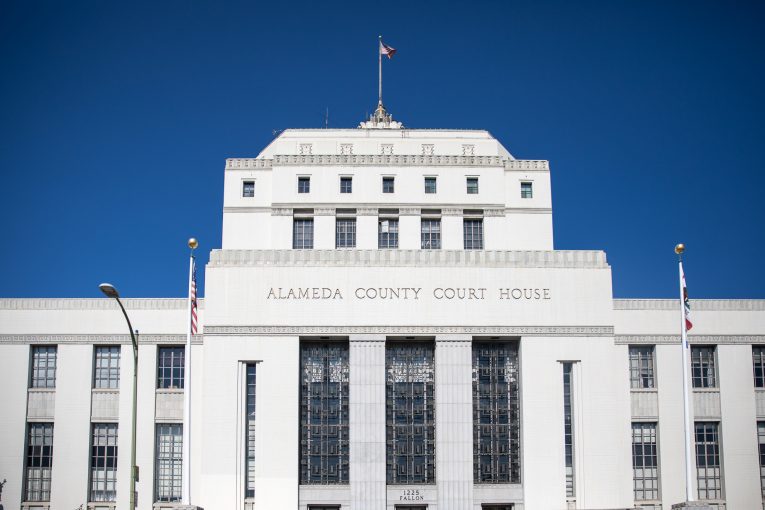

By Anna Olsen and Mansour Taleb-Ahmed
ALAMEDA, CA – The ethnicity and mental health of an alleged perpetrator of a 2013 gang-related double homicide was discussed this week at a pretrial hearing here in Alameda County Superior Court nine years after the original crime was committed
Alleged gang members Robert Dylan Redding and Eric Estrada were charged with two counts of murder and two counts of gang enhancements in August of 2013 for the shooting death of two victims that took place in Union City, CA.
One victim was shot twice in the face and one was shot in the back.
During interrogations, the two men allegedly accused each other of being responsible for firing the gun.
Redding informed police that Estrada confronted and murdered both victims, one of which Estrada suspected to be a rival gang member, with a .357 revolver that Redding gave to him. Estrada told investigators that Redding was the shooter.
A discussion surrounding a subpoena submitted to court by defense counsel David John Briggs requesting “all records of diagnosis and treatment of Mr. Redding” was discussed in a hearing that took place this week regarding Redding.
Briggs said he is requesting these records because of the behavior of Redding in an interrogation in which he “displayed pressured and perseverative speech, often repeating himself.”
Briggs believes that Redding is suffering from a mental illness and may be on psychotropic medication which he argues will impact his court demeanor during trial, and that “the jury needs to have a full understanding of how and why he presents as he does.”
Deputy District Attorney Peter McGuiness argued that these records have no connection to the crime that occurred nine years ago and therefore should not be reported.
“The courtroom demeanor is always something the jury takes into account,” DDA McGuiness argued. “I don’t think that simply saying he might have a different courtroom demeanor justifies having such a privacy intrusion in this case.”
In response to the claim made by Judge Thomas Reardon that his request was too broad, Briggs clarified that these records would provide a basis for the cross-examination of Redding and that it is the responsibility of the court to decide which records are relevant to the case and which records he should have access to.
To this claim, Judge Reardon stated that the courts accessing these records would constitute an “invasion of properly invoked privilege.”
Additionally, the ethnicity of the defendant was discussed during the hearing.
Defense Counsel Briggs expressed apprehension regarding the jury’s alleged bias against the Latinx community, and requested that a few questions be included in the court questionnaire directly addressing racial bias against the Latinx community among the jury.
“I’m not asking for a large number of questions, your honor, but I do think that a few questions along these lines would be helpful, appropriate and in line with AB 3070,” said the attorney.
AB 3070 requires an attorney to provide clear and convincing evidence upon the issuance of a peremptory strike, which is the exclusion of a potential juror with no required explanation. This law took effect in criminal trials on Jan 1. of this year and has a goal to fight implicit racial bias within court rooms.
“We need to be able to make a complete record of why people were excluded,” Briggs argued. “I can imagine a situation where we develop a suspicion that a person of a certain ethnic background will not be favorably inclined for our side. AB 3070 requires a more searching inquiry than we may be accustomed to.”
Briggs argued that these questions would allow the jury to voice their opinions in a neutral setting and added “people will be more inclined to express racial animus – if they have it – when they are not sitting face to face with a person of that race.”
In response to this request from Briggs, DDA McGuiness argued that a question addressing the Latinx community directly is unnecessary since the victims and many witnesses were also members of the Latinx community.
“I think when you start highlighting certain things then you get in the territory of improper questions that do not necessarily go for cause and the wording is very problematic.”
Judge Reardon and DDA McGuiness proposed the inclusion of a question that addresses racial bias more generally instead of targeting the Latinx community directly.
“I don’t believe that solves the problem,” Briggs responded. “Since my client is Latino I have to attempt to uncover bias against Latino people.”
After listening to the arguments brought by both sides, Judge Reardon drafted and proposed a new question for the possible jurors: “In this case, the defendant, the victims and many witnesses who will testify are Latinos. Do you have any feelings or experience with anyone of that ethnicity that you think will influence your ability to be a fair and impartial juror?”
Both McGuiness and Briggs accepted this proposal.
Briggs wasn’t completely content, however, and requested that a question be included that asks the jury “How much discrimination against Latino people do you feel there is in the United States today.”
Briggs clarified that this question was drafted for him by the National Jury Project based in Oakland, CA, an organization constituted by social science researchers and experts, noting, “This question will be more effective at bringing to light ethnic bias than a simple direct question.”
Briggs argued that “It’s asking how they feel and experts have shown that people who feels there is no discrimination probably harbors some ethnic bias. It’s an indirect way to bring light to an attitude with evidence of ethnic bias.”
Judge Reardon denied this request from Briggs.
Estrada will have his own pretrial hearing this week.

